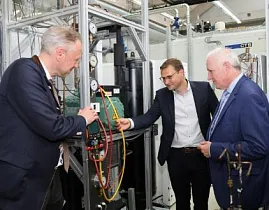The first of its kind innovation action, focusing on Cryogenic Energy Storage (CES) and supported by Horizon 2020, is approaching its end. A relevant project with the intriguing name CryoHub (Developing Cryogenic Energy Storage at Refrigerated Warehouses as an Interactive Hub to Integrate Renewable Energy in Industrial Food Refrigeration and to Enhance Power Grid Sustainability) which started on 1 April 2016, is now going to finish on 31 March 2021. CES is a known but still rather underdeveloped energy storage principle, where excessive or renewable power is used to liquefy and store a cryogenic gas. This liquid cryogen is then pumped and boiled at low temperatures to run turbines and produce electricity for either on-site use or feeding the power grid during peak demand periods. Unlike standalone CES systems generating power only, CryoHub is capable of working in a cogeneration mode to supply also cold to a refrigerated warehouse or both heat and cold to a food factory equipped with refrigerated facilities.
Refrigerated food warehouses require large cooling capacities to maintain or reduce the temperature of food in a way which maximises product safety, quality and shelf life. Stored liquid cryogen is capable of providing part of the refrigerating demand in large storage warehouses or food factories, being thereby heated for the purposes of power generation. Integrating CES into food storage or processing facilities is a novel and attractive means for fostering the employment of Renewable Energy Sources (RES), revealing also a substantial potential to improve efficiency. In this context, CES and RES are mutually enabling technologies.
WHAT HAS BEEN ACHIEVED?
The intensive 5-year work programme of the CryoHub consortium (comprising 14 academic and industrial partners from Belgium, Bulgaria, France, Poland, Spain and UK) permitted to achieve substantial results centred on (i) present and future potential of CES at refrigerated warehouses; (ii) key processes and unit operations to take advantage of CES in a common refrigerated warehouse or food factory; (iii) synergistic and mutually-enabling action of CES and RES-based technologies; (iv) engineering solutions for consolidating a CES system into a typical warehouse refrigeration plant in an efficient manner; (v) control strategy and system for automated energy management of CES as a function of the warehouse performance, RES and grid behaviour, environmental conditions, energy demand and availability, price variation, etc.; (vi) semi-industrial pilot plant for testing and demonstrating the CES operation in conjunction with a refrigerated warehouse; (vii) knowledge disseminated to stakeholders and end users from the energy and food refrigeration sectors; (viii) stakeholders’ engagement and CES-related energy policy; (ix) further prospects for CES implementation in the food refrigeration sector across Europe and beyond.
CryoHub has been an active actor in the EU-endorsed BRIDGE initiative creating synergy between R&D&I projects dealing with energy storage, as well as with energy grids and networks. Building a functional prototype to demonstrate the CryoHub technology turned out to be a hard nut to crack, but this important challenge has efficaciously been faced, due to the proficiency of industrial partners, such as Dohmeyer, Frigologix and Air Liquide. The CryoHub demonstrator was recently assembled and is currently being tested at the warehousing site of Frigologix, near the city of Lommel (Belgium). The test results, along with the overall project outcomes, will be presented and discussed at a closing workshop which will be held in the format of an online webinar. Registrations are welcome on:
https://lnkd.in/dhj4DTX





